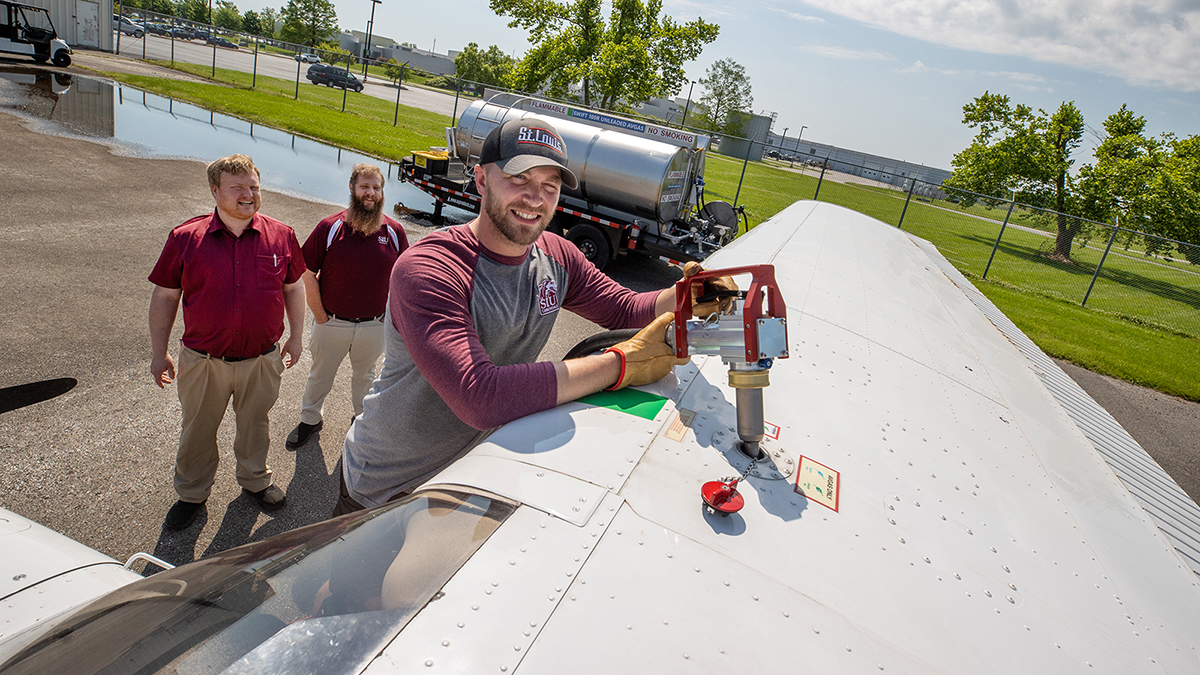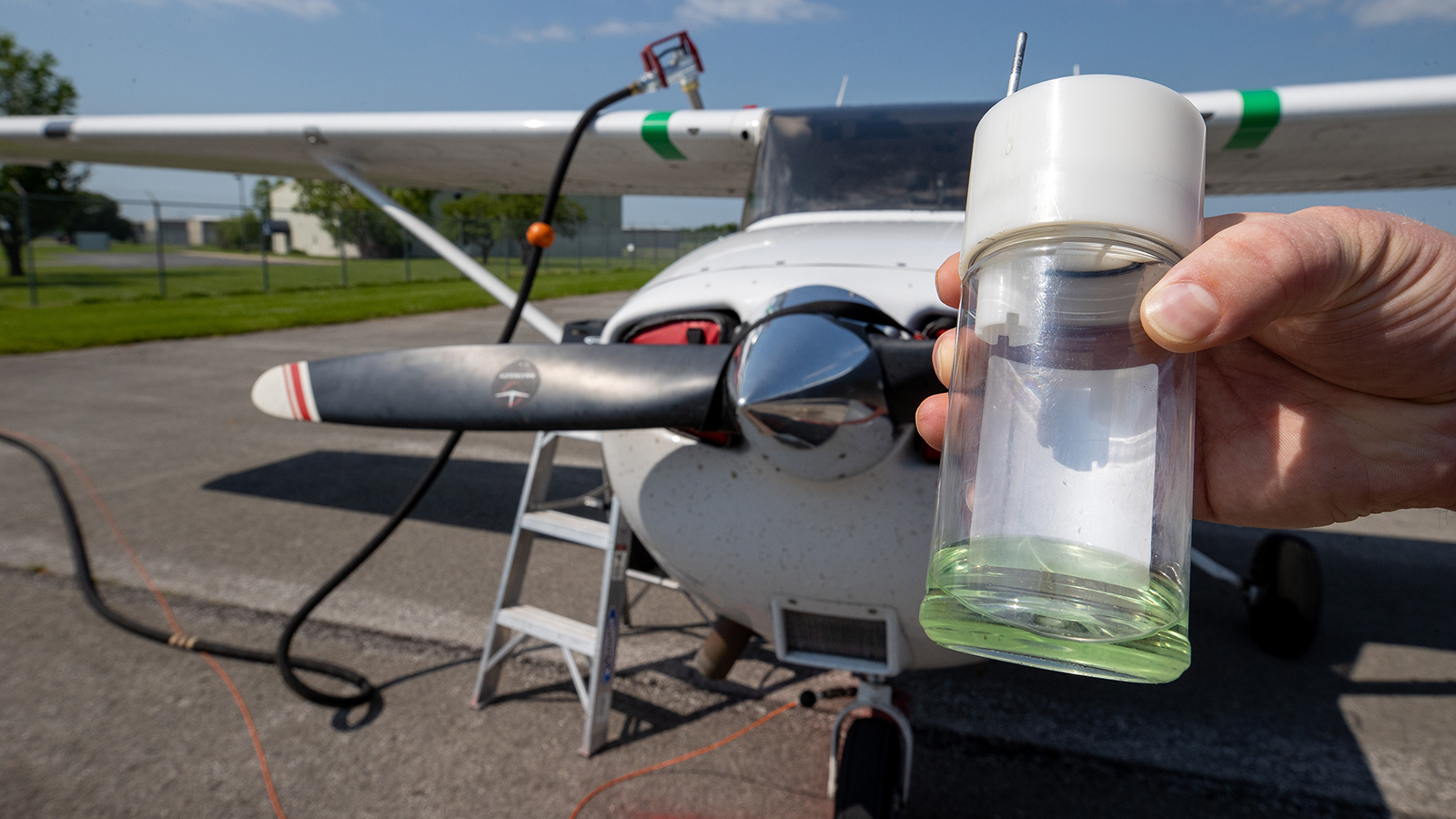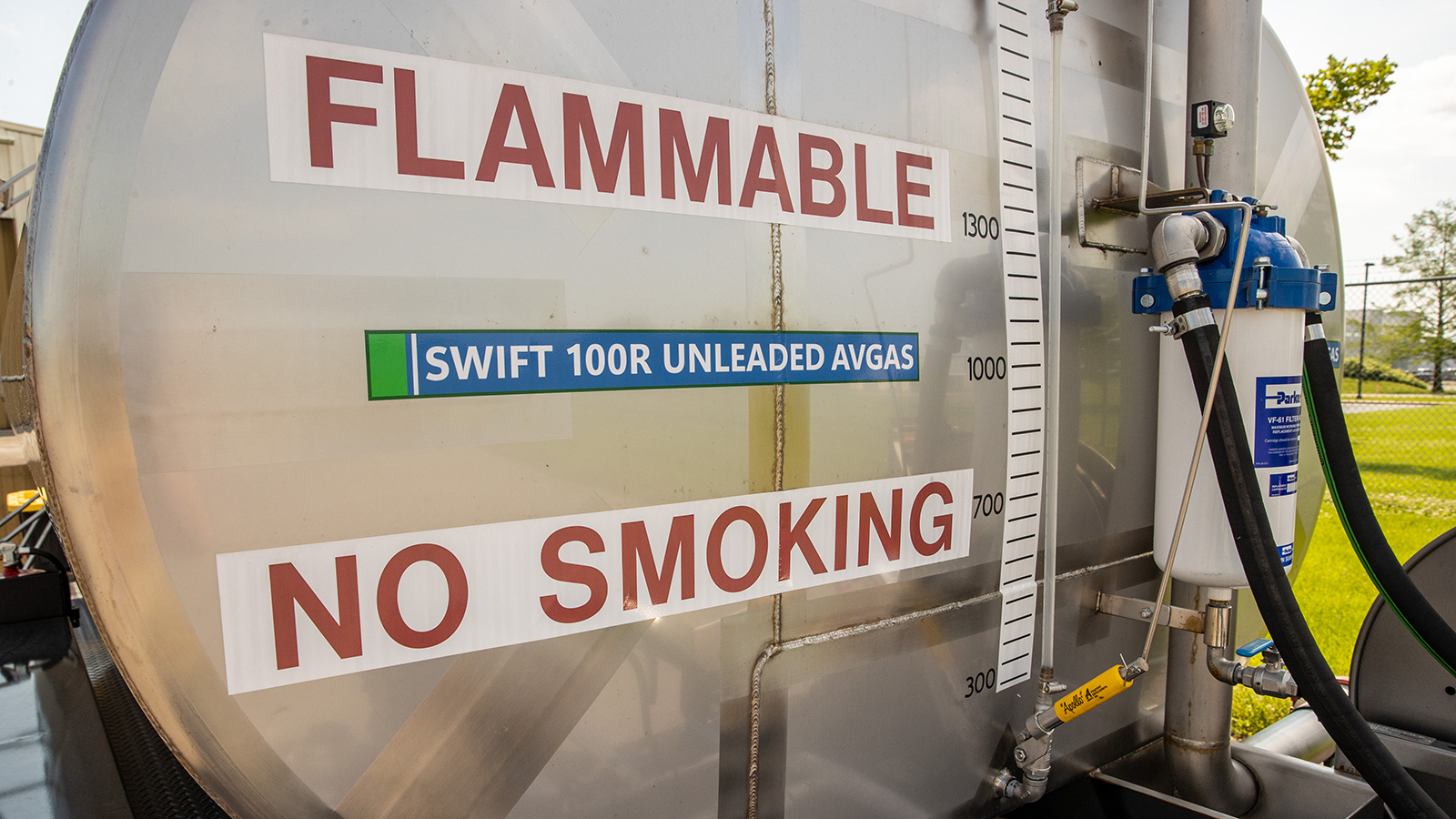
Daniel Hoskins, a flight line attendant, fuels a Cessna 172S training plane with 100R unleaded fuel as SIU Aviation faculty Kenneth Wilkins and Steven Goetz look on. They are among faculty involved in research on the viability of general aviation aircraft using unleaded fuel, highlighted by its green color. The fuel is stored in a 2,000-gallon mobile refueler. (Photos by Russell Bailey)
June 03, 2025
SIU Aviation researching viability of unleaded fuel
CARBONDALE, Ill. — Researchers in Southern Illinois University Carbondale’s School of Aviation could help spur the adoption of an unleaded fuel for general aviation piston aircraft both in the United States and worldwide, reducing the toxic metal’s presence in the environment.
Lead was added to gasoline in the 1920s to increase octane and eliminate engine knock. Because of the health hazards associated with lead, the Environmental Protection Agency required leaded gasoline to be phased out over 20 years starting in 1973. Automakers were able to move away from leaded fuel because cars and trucks typically use 80- to 90-octane fuel components. Piston aircraft pilots couldn’t make the transition at that time, however, because there has been nothing to replace the 100-motor octane gasoline required for those plans until recently, said Steven Goetz, an associate professor and chief flight instructor who is one of five faculty members involved in the research.
“We are trying to get away from the lead, and the government keeps talking about phasing out lead altogether,” said Kenneth Wilkins, assistant professor in aviation flight. “The aviators’ concern is that if you get out the lead, do we have a safe alternative?”
With the assistance of Swift Fuels, an Indiana-based fuel developer and supplier, SIU Carbondale is assessing the company’s 100R octane unleaded fuel in two of its Cessna 172S training planes and comparing operational data to other planes in the fleet that use 100 low-lead fuel. While the 100R unleaded fuel is being used on a restricted basis in flight school locations around the country, “SIU is, to our knowledge, the only academic institution conducting research that compares operational data from aircraft using the two different fuels,” Goetz said.
Irene Miller, an assistant professor in aviation management, was researching unleaded fuel use in general aviation planes and contacted Swift Fuels in May 2023. During this period, Swift was working diligently to complete an extensive number of high-stress FAA-certification engine tests, FAA flight tests and ASTM International fuel standards. In September 2024, the FAA issued the first supplemental type certificate (STC) approval for 100R unleaded fuel, which is now positioned for use in the U.S. and Europe.
Swift’s 100R fuel arrived at SIU in mid-March 2025 and is now being used in two planes, with two Cessna 172S planes using the 100 low-lead fuel in the study for direct comparison. Engine and performance data are also being mined from the program’s other general aviation planes using 100 low-lead fuel for aggregate comparison. The other faculty members involved in the research are James Barker, assistant professor, and Matt Harrison, associate professor, both in aviation technologies.
Early findings are positive
 While the study continues, early results for using the unleaded fuel look promising with an eye toward changes in aircraft condition, engine lifecycle and power output. The goal is to have preliminary findings available for the EAA AirVenture Oshkosh Air Show in July, with publication this fall.
While the study continues, early results for using the unleaded fuel look promising with an eye toward changes in aircraft condition, engine lifecycle and power output. The goal is to have preliminary findings available for the EAA AirVenture Oshkosh Air Show in July, with publication this fall.
“It’s my understanding that it appears to be the same horsepower and is providing a cleaner burn with less engine wear,” said Miller. “100R seems to be performing as expected. So far, we have not seen any abnormalities in aircraft or engine performance.”
The 100R fuel contains a proprietary valve seat recession additive, designed to ensure proper engine operation and prevent certain types of deposits, corrosion and engine wear. The octane booster Swift Fuels is using to replace the lead is an oxygenate that has a renewable component derived from biomass, Wilkins said.
“The cylinders appear cleaner, and there is not as much deposit, not as much gunk from the combustion residues because the lead is not in there to hold it,” Goetz said, adding that increased fuel burn is not yet showing up in data.
FAA interest in research
The Federal Aviation Administration has requested operators who are using high-octane unleaded fuels to report any service difficulties or abnormal maintenance issues, Wilkins said. The agency is also interested in hearing from operators who have made the switch to unleaded fuels without any notable issues.
Goetz said the agency is keen on finding an unleaded fuel to replace the 100LL, or low lead, across the nation’s piston engine general aviation fleet of about 180,000 aircraft.
“The FAA needs data beyond the testing labs to be able to get that,” Goetz said. “This has the potential to have some really significant impacts and drive not only the research on this but also the practical aspects of what is the government going to do when they start looking at finding a 100LL-octane replacement.”
Goetz noted there are areas in the country, particularly California, where communities have banned the sale of low-lead fuel, and the FAA is involved in litigation to make sure that low-lead fuel is available to aircraft, noting that the aviation community is also concerned with the environment.
“We enjoy flying, and we want to be able to continue to do that. We also have to have the fuel to be able to do that,” he said.
“We’re OK, in general, with an unleaded alternative, but we need to make sure it is available. We need to make sure it is safe, and that it will not cause any damage to the aircraft because it’s not a car. If your engine blows up, you cannot just pull over. You have to make sure that the unleaded fuel has at least the same criteria and does the same stuff as low lead in order to maintain the safety of the industry.” 
Swift Fuels CEO Chris D’Acosta said his team was very excited by the enthusiasm of the SIU faculty, staff and students, and he looks forward to a long-term collaboration in assisting the deployment of 100R across the U.S. and worldwide.
